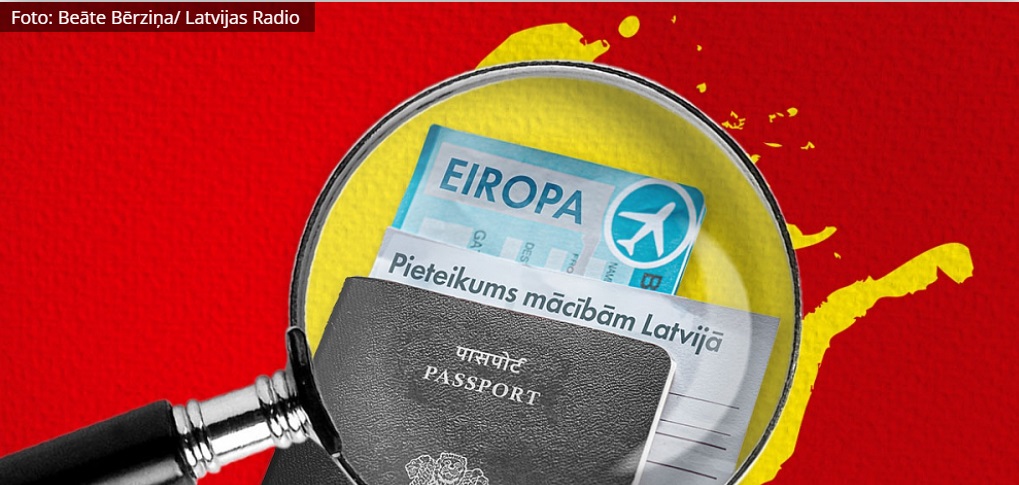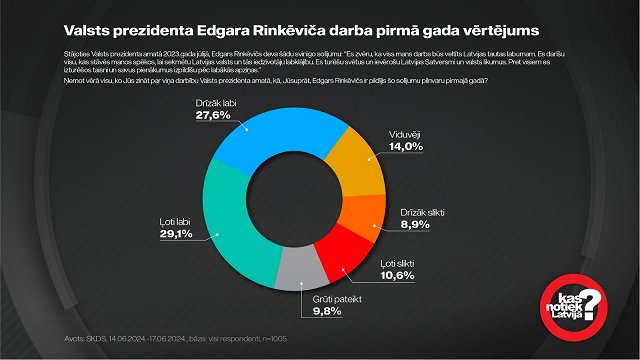Some apply for study programs as a way to enter the European Union (EU) and, equally, for some educational institutions, attracting foreign students is just a facade.
Which educational institutions in Latvia only formally attract foreign students, but are actually engaged in the immigration facilitation business? And why have the responsible authorities been allowing this to happen for years already? Those are the key questions asked by Latvian Radio's reporter.
It's an April morning, and Latvian Radio meets a young man from India in Ķīpsala, at the student campus of Riga Technical University (RTU). His name is Yogesh Sharma, and he studies at the Faculty of Computer Science, Information Technology and Energy. He is one of the real students, seizing every opportunity and working hard to educate himself to the highest possible level.
"I completed my bachelor's program in Business Management and now I'm continuing with a master's program in Business Informatics. Well, it's a lot about IT and stuff like that," says Sharma. The 24-year-old has been living in Latvia for about four years.
"I finished school - 12th grade. I was interested in studying outside India, of course, because an education outside India is good! I wanted to acquire additional skills, so I thought about Europe. And then I thought about Latvia, because the tuition fees here are a bit cheaper than in other countries like France or Sweden."
He researched university offers on the Internet and decided that he wanted to study at RTU. Yogesh approached a company that helps with admissions to foreign schools.
"We have consultants in India who help people to study outside India. When I chose Latvia, I went to them afterwards. I asked them how they could help me apply to that university, because I didn't know how to do it myself. They did it for me, like applying to the university, then submitting all my documents, and then helping me pay the tuition fees, sign the contracts and all that. It was a complicated process, but they helped, so it wasn't that complicated."
It took about three months before he received his entry permit – a visa. Before that, he had to take entrance exams and convince RTU in a remote interview that he really wanted to study.
"I also had to know about Latvia, of course, because they ask a lot of questions in the interview. For example, why did you choose Latvia? Why exactly that university? Why exactly that course? What do you know about Latvia? Of course, I had to go through everything on the Internet to look it up."
After arriving in Latvia, Yogesh received a temporary residence permit. He learned the Latvian language through self-study.
"My consultants in India said that if you want to go to Latvia and do something, or find a good job, then you probably need to learn Latvian. That's why I started learning through YouTube Latvian language lessons. I think that during a year I had (learned) a basic level."
Currently, in parallel with his studies, he works in a company as a sales manager.
Asked if he has heard of other foreign students who come to Latvia with the goal of studying, but do not actually study, Yogesh says: "Sometimes, yes! But there are many individual situations every time, because sometimes it happens that people come here with big goals and ambitions, but they have a hard time studying here or can't earn anything. And their motivation goes down. But I haven't heard of many (such cases)."
Yogesh says that there are students who try to change universities in such cases, looking for places of study where they would have to go to lectures less. He has also heard that there are schools that are easier to get into, but they are not the big universities.
"I have not seen Indians coming to small institutions to study because it is difficult for them to get a visa. Most Indians come to RTU," he says.
Among all Latvian universities, RTU has the largest number of foreign students. Most are Indian citizens. According to the data of the Ministry of Education and Science (IZM), there are 1,230 of them.
In Latvia as a whole, the largest number of foreign students come from India and their number reaches 2,667. Then follow students from Uzbekistan, who number 1,271 and 700 students are from Sri Lanka.
At the end of last year, there were 10,653 foreign students in Latvian higher education institutions who, in addition to the already mentioned RTU, studied at Riga Stradiņš University, Information Systems Management Graduate School, Business Graduate School "Turība", the University of Latvia and others.
For those who want to study to come to Latvia from third countries, they need long-term visas. They are issued by Latvian representative offices abroad. In the long-term visa application, third-country nationals must indicate the purpose of entry, which in the case of students is study. Foreigners who receive an invitation from educational institution or who have been admitted to a university can apply for study visas.
Questionable colleges
In informal conversations, it is said that there are four educational institutions in Latvia that accept citizens of third countries, but do not sufficiently assess the students' English language skills. They are two colleges as well as two training centers.
"Nowadays, you can build a career anywhere in the world, so it is important to get an education that not only prepares you for professional careers, but is also internationally recognized. This is exactly the kind of education offered by the "Hotel School" Hotel Business College," - this is an excerpt from "Hotel School" Viesnīcu business college.
The college offers higher education studies in hotel management, business and catering management, and also provides professional education programs including British-accredited 'Btec' vocational programs.
The tuition fee for third-country nationals in each of the programs is 5,000 euros per year. The college is small. For example, last year there were a total of 60 students, most of whom, or 40, were foreigners from countries such as Cameroon, India, Vietnam, Sri Lanka and others.
According to Latvian Radio, last year one in three foreigners who received an invitation to study at the "Hotel School" was refused a visa application, while a year earlier - visas were not issued to more than half of them.
This means that they did not have the necessary travel and education documents to receive a visa, other formalities were not completed, or the applicants did not know enough about Latvia during interviews carried out with the embassy staff.
The "Hotel School" is located in Old Riga, just one hundred meters from the Ministry of Education. Latvian Radio visited the college and met study methodologist Nataša Stoļarova and asks her how the college attracts foreign students. "Actually, you should talk to Jūlija Pasnaka about this issue," says Stoljarova and asks to turn to Jūlija Pasnaka, the director of the college and the chairwoman of the board.
Pasnaka does not agree to an interview, but writes in an e-mail that the short-cycle higher education program "Organization of Hospitality Services" is the most popular among foreigners. It takes less than two and a half years to learn it. When asked whether foreigners also arrive with poor knowledge of the English language and how their language skills are tested, Pasnak states in a written answer:
"Foreign students have at least a B2 level of English. This is confirmed by the opinion of an internationally recognized testing institution, which they submit at the admission stage. Staff of the Admissions Commission conduct Skype interviews with applicants to check their motivation for studies. Students in professional continuing education programs have lower requirements for knowledge of the English language. In some cases, this knowledge is really low, as is the case with the students from Ukraine, who are accepted by the college within the framework of the "Erasmus+" program.
Pasnaka admits that often foreign students have good attendance in the first semester, but in the second semester, when they start working alongside their studies, it can get worse.
"This tends to reflect on the students' performance as well. If a student has academic debts and does not settle them by the set deadline, he is dismissed. In the internal rules of procedure for students, the obligation of students to inform the college about the reasons for absence is mentioned. There are students who do this by submitting a doctor's certificate or writing other explanations, but there are also those who do not follow these rules and as a result are expelled."
Next, Latvian Radio approached Riga Management College. Its employee said that the institution is in the process of licensing programs, so students are not being accepted at the moment.
Last year, 40% of third-country nationals invited by the college received visa refusals. This raises questions as to whether the educational institution has sufficient admission criteria. Director of Riga Management College Oļegs Nikadimovs only answers in writing to Latvian Radio's questions:
"We would like to inform you that Riga Management College currently does not implement any short-cycle professional higher education study program and does not attract foreign or Latvian applicants, therefore we cannot provide detailed answers to your questions."
Latvian Radio also tries to communicate with two other training centers. One of them is the Riga International Learning Center, which, among other things, offers various courses, mainly related to beauty care. Last year, the institution invited seven citizens of third countries, but the embassy issued visas to only one, according to the Office of Citizenship and Migration Affairs. This training center was opened by the company "Ellada L", and it asked to send questions by e-mail, but Latvian Radio never received answers.
Finally, Latvian Radio also calls the language center "Pygmalion". Again, it was not possible to arrange an interview with the management of the "Pygmalion" language center.
Although informal sources say that these four educational institutions do not sufficiently evaluate the English language skills of future students, it was not possible to get convincing answers from the institutions themselves that would completely dispel such suspicions. The number of visas refused to foreigners applying to study raises questions.
Application rejected
The Consular Department of the Ministry of Foreign Affairs (MFA) collects information on visas issued in Latvian representations abroad. The director of the consular department, Agnese Saliņa, says that for several years she has been facing the problem that there are educational institutions that evaluate potential students poorly. What allows embassies to draw such conclusions?
"These are incomplete documents that contain signs of forgery, also doubtful documents certifying education. The second [indicator] is that students cannot really explain their purpose of entry. They often don't know anything about Latvia. They do not know anything and cannot explain about the chosen university. Also, there are often obvious doubts about students' language skills - who is the real document submitter? Let's say, it is clear that someone else is trying to do this interview instead, with better knowledge of the English language," explains Saliņa.
Also, the embassies observe that the general knowledge of individual visa applicants is weak. "This mainly shows that there are educational institutions that take an extremely uncritical approach to the selection of these students – in fact, there is no such selection. Any student who wants to can apply. That is, you pay a certain tuition fee and an invitation is prepared for you, you can go to study in Latvia."
Last year, embassies rejected 624 visas, which was 15% of cases. However, this proportion was even higher before the pandemic – in 2019, Latvian embassies abroad rejected 1,389 study visa applications, which was 32% of applications. Although the situation is improving, Director of the Consular Department Saliņa still considers it to be too high.
Last year, the highest percentage of visa refusals was at the Latvian representation in India, where they were 18%. 478 people who wanted to study were refused, but before the pandemic, in 2019, study visas were not issued to 43% of applicants who applied at the embassy in India. In the United Arab Emirates, visas were refused to 4 people, which was 19%. In Uzbekistan, on the other hand, there were 98 refusals, or 17% of the total number.
But even if a study visa is issued, it can be cancelled. This is most often done by the State Border Guard. The head of its Immigration Control Department, Agnis Višņevskis, reveals that 162 study visas have been canceled since 2019. This year, up until April – 28.
"Of such nationalities, of course, the most are Indian and Vietnamese, but there are also others. There are Turkish, Sri Lankan – many different countries," Višņevskis explains.
In January this year, the border guard canceled the visas of a group of Vietnamese students.
"We found out at the airport that these educational institutions have invited this group of third-country nationals who are trying to travel as if to learn a language. But at the same time, when conducting an in-depth interview with them, we could not get any information from them, what do they really want to do here. And it was also impossible to communicate in any language."
There were seven young men in the Vietnamese group, four of whom were minors of sixteen and seventeen years old. This group was denied entry because the Vietnamese likely had no intention of studying.
"There are some cases when these potential students do not go to the Citizenship and Migration Affairs Office to fill in documents in order to study here, but upon entering, they go on Schengen flights to Germany, to France, in order to travel further," says Višņevskis.
When asked if the border guard keeps track of whether the students who come to Latvia really study here, Visņevskis says: "From time to time, raids are also carried out in cooperation with other institutions, both in student hostels, and also in cooperation with universities, the following are separately searched for students who can't stay here anymore because they don't do the paperwork. But it's not really our responsibility to check if they are sitting in lectures."
The Border Guard informed the Ministry of Interior about the Vietnamese case. In April, it sent a letter to the Defense, Internal Affairs and Corruption Prevention Commission of the Saeima with a call to improve the Immigration Law. Diāna Laipniece, Director of the Department of Science and Innovation in Higher Education of the Ministry of Education and Culture, says:
"We have learned that there is also a very dishonest practice that does not attract real students, but is something completely different – a profitable business of illegal immigration, where it is often not about studies, but about ghost courses, which happen one hour a week or maybe not at all in reality. And under the guise of this education, visas and residence permits are then obtained."
Asked if this problem had been noticed before, and why nothing was done or not enough was done about it, the representative of the Ministry of Interior says: "Obviously not enough was done. Yes, there were some signals, and there were good practice attempts to sort it all out , but we see that it is not enough at the moment."
The Ministry recognizes that the supervision of educational institutions should be improved.
"If this appears as a profitable business niche, then the next and the next institution can appear tomorrow. There are resourceful people there. Everything will look wonderful there about the study process and so on, and we will not have a reason, for example, to deny them accreditation as an institution."
On May 23, the Saeima adopted changes to the Immigration Law in the final reading, which will increase the responsibility upon colleges who invite foreigners to study. This means that if educational institutions do not comply with the legal requirements for inviting students to Latvia, then they will be able to be punished – that is, they will not be allowed to invite other students from third countries for a while.
Will these changes fix the problem? The Ministry of the Interior only expresses hope and says that if it turns out in practice that this will not be enough, then it will come up with some other proposals.
However, the amendments to the Immigration Law were adopted by the Saeima with the main aim of disciplining employers who invite employees from abroad to Latvia, but not on the grounds of fixing problems with educational institutions, which increase the risk of illegal immigration by their actions.
The changes could solve the problems, as long as the responsible authorities are able to control the dishonest entrepreneurs. True, it has not been successful for years already. In addition, as several of those interviewed suggested, if one educational institution is liquidated, another one quickly takes its place.
Yogesh Sharma, the hardworking student from India, hopes to get his master's degree next year, but sadly he does not see his future life in Latvia. "I want to live in a big country – where there are many people, for example. Yes, somewhere in Asia or somewhere in Europe!" he says.
However, he believes that most foreigners still come to Latvia with a legitimate desire to study. "I think that everyone has their own experience, because everyone has their own way of thinking. The majority, I think, came to Latvia to study, to finish their bachelor's or master's degrees. And then they will go back to their own country."
































